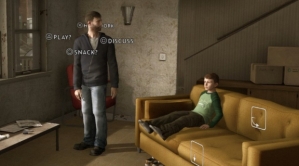What side of the glass are you looking through?
The concept of the 4th wall is a metaphor derived from the geographical nature of a theatre, the existence of 3 walls; one to the right, one to the left and one behind us, the fourth being the screen. We the audience are passive viewers of the activities on a screen, sure, video games are already flipping the passive script and getting our lazy asses involved. From interactive cutscenes to getting up and having a dance when the wii tells us to, there is certainly a thumb on the pulse of player interaction. You could say the breaking of the 4th wall is just a developers intention to add some humour to a serious moment and for the most part it is. Actually, I cant really think of any reason other than humour to be honest, so lets stick with humour.
If we are going to talk about the concept of the 4th wall we are going to talk about Metal Gear Solid, lets face it.
There is a very crafty man out there (well, in Tokyo) that has taken video games to a whole other level, and has made us do a lot of waiting in the process, and for good measure too, can any one honestly tell me they have encountered a glitch in a MGS game? No, well okay then. Kojima and his team has built a monstrous world of fiction around the MGS franchise, each game ties itself into one another using quotes, items, scenes, characters etc. You could say that even that is a little hole in the 4th wall in itself. But there was one important moment, for me at least that exposed me to the raw integrity of player to video game interaction:
It was a warm night in the summer of 2001, when Ryan, an old friend of mine and I rented out Metal Gear Solid 2: Sons of Liberty from the local Blockbuster, we took it home with our Subway dinner and played it for hours (you see only when you’re young you can some how manage to play a 1 player game with 2 people). Into the long hours of the night our eyes grew weak and Ryan had fallen asleep, but I continued playing, in the dark, in amazement. And for those who remember reaching Arsenal Gear for the first time, things get a little bit creepy, when GW begins to break down and those NPCs you thought you trusted lose all control. Sleep deprived and left having to get Raiden’s naked ass through the mission, this happens…
I should have just called the post “I need scissors, 61!”. So try to imagine I am alone in a dark room and the video game starts talking to me, no, it wasn’t the Subway sandwich, it was in fact the one of the finest moments in gaming history. Sure this concept appears in film also, but all they can really do is get the actor to look into the camera and say “hey you!”, woah man, that was funny the first time and all, but us gamers have got something really special going on here. When used in moderation the 4th wall can be a nice bit of fun, however, over use can detract from the strength of the storyline, it must be treated with a level of elegance for it to mix.
Hell, even I dabbled in 4th wall entertainment when I was featured on Good Game the other night 😀 Check the link!


